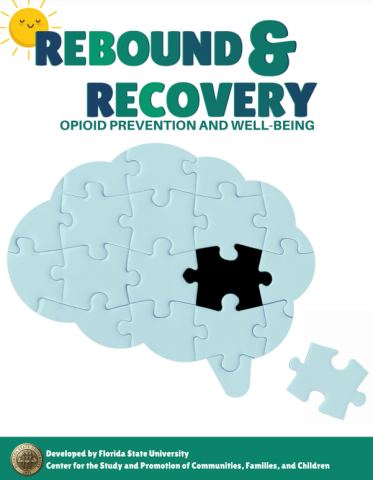Raising Awareness to Prevent Teen Opioid Misuse

The Southeast Rural Opioid Technical Assistance Regional Center (ROTA-RC), an integral initiative under the umbrella of the Center for the Study and Promotion of Communities, Families, and Children (CFC Center) at the FSU College of Social Work, raises awareness about the alarming rates of teen opioid misuse, the consequences of overdose and the importance of prevention strategies for teenagers.
Intentional opioid misuse by teenagers accounts for nearly three-quarters of the calls made to poison control centers, according to Dr. Natalie I. Rine, director of the Central Ohio Poison Center at Nationwide Children's Hospital. Almost 70% of teens using prescription opioids without a physician's order access them through friends and relatives, both with and without their knowledge. Drug misuse often results in severe outcomes that include hospitalizations and fatalities, with the deaths from drug overdose surging by more than 50% since 2000.
Some youths are also at an increased risk for engaging in behaviors like high-risk substance use. Youth with substance use disorders experience higher rates of physical and mental illnesses, diminished overall health and well-being, and susceptibility to addiction progression. Opioid misuse particularly increases teenagers' likelihood of engaging in high-risk behaviors and exposure to physical and sexual dating violence.

KC Callison, the Opioid Prevention and Harm Reduction Specialist at ROTA-RC shares a profound recollection of their experiences with opioids during their first year of high school. "I will forever remember the sheer panic etched on my face as I stood before the school nurse, followed by a fleeting vision of being whisked away on a stretcher, descending into unconsciousness," Callison recalled. "It was only by a stroke of luck that I regained partial consciousness in the Emergency Room, my face smeared with charcoal. The brutal truth was that I had rummaged through my parents' medicine cabinet the previous night, stuffing my pockets with anything bearing the warning of 'do not drive or may make you sleepy' in pursuit of a high. Little did I know that this decision would bring me perilously close to the edge of death."
"Prevention strategies directed at teenagers remain a pivotal part of ROTA-RC's mission, particularly the health risks of opioid misuse," added Callison.
This year, ROTA-RC developed a comprehensive curriculum and professional certification for teen opioid prevention called "Rebound and Recovery: Opioid Prevention and Well-Being." The certification combines evidence-based established programs and insights from rural focus groups to provide middle and high-school-aged youth with essential knowledge about emotions, self-regulation, healthy lifestyle habits, and opioid prevention.
ROTA-RC's certification is designed for librarians, 4-H extension staff, educators, and other youth service providers, offering flexibility with one-hour or multi-session implementation options. The one-hour lesson integrates all main concepts, and the Lesson One manual is available for free download on the ROTA-RC website. The online self-paced certification, including interactive videos and multimedia, is being beta tested and will be accessible soon on the ROTA-RC website, along with a digital download manual to implement the lessons and a digital journal for teens as part of the curriculum. Savannah Smith and Tai Cole's presentation on the certification at ROTA-RC's recent Opioid Use Disorder and Rural Resiliency Symposium on the certification (see below).
"By equipping caregivers, service providers, teachers, and communities with the necessary education and resources, the impact of the opioid crisis on our youth can be mitigated," said Ellen Piekalkiewicz, the CFC Center's director. "Identifying at-risk individuals and addressing underlying risk factors, such as isolation, bullying, abuse, neglect, family history of substance misuse, and mental illness, is vital. Cultivating positive relationships and providing adolescents with coping skills, shared decision-making techniques, and access to resources can significantly reduce risks and foster wellness."
ROTA-RC collaborates with stakeholders, including the Florida Department of Children and Families, Florida A&M University Cooperative Extension, and state poison control centers, to emphasize opioid prevention and teen wellness.
Learn more about ROTA-RC at serotarcnetwork.org.
